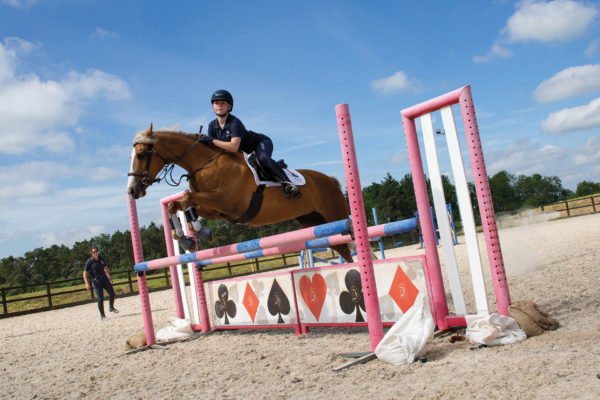A New Generation Of Entrepreneurs
By
1 year ago

A new generation of entrepreneurs are making waves, finds Emma Reed
It’s fair to say that the future of the workplace is becoming ever harder to predict. Rapid developments in AI will render some jobs obsolete and others, not currently within our contemplation, will exist. What is certain, is that the next generation will need to be adaptable, responsive, resilient and globally minded, armed with a set of skills to enable them to thrive in a fast-changing world. An entrepreneurial way of thinking will benefit them even if they have no desire to emerge as the next Dragons’ Den success story. Philip Salter, founder of The Entrepreneurs Network, wrote in Forbes last year about the UK’s top entrepreneurs calling on the government to prioritise entrepreneurship education, to embed it in the curriculum rather than teach it as a separate subject. Some schools are increasingly active in this area and see this as a way of future-proofing their pupils.

BBC’s Dragons Den
For example, Sherborne Girls runs a specific Entrepreneurship in Education Programme, showcased in an inspiring video on their website. Emma Wimhurst, their Entrepreneurship Co-ordinator and A-level business teacher, is a dynamic role model for the pupils. She grew a cosmetics business with a multi-million pound turnover from her kitchen table, wrote Boom, a book about business, and appeared on the BBC show Beat the Boss, before she decided to take what she had learned into the education sector. ‘I wanted to make a genuine difference to young people,’ Wimhurst says. As a result, Sherborne runs its entrepreneurship programme throughout the school and it is not confined to sixth formers, as in many places.
Wimhurst emphasises that you don’t need to have running a business as your aim to derive all the benefits from the skills learned in entrepreneurship. ‘Having a clear vision, being able to communicate well, being part of a team and creative problem solving. Most firms are looking for employees that have all the skills of an entrepreneur.’ It’s never too early to learn either; years seven and eight enjoy an entrepreneurship day where a company comes into school and pupils participate in a real-world business problem. ‘They work in teams, but not in a team they would naturally choose,’ says Wimhurst, a reflection of life in the workplace. ‘They find creative solutions to the problem and then present together as a team and those are skills that I think are crucial to success in life,’ she adds.
Director of Development, Katherine Massey explains that one of the recent activities was the NatWest ‘Go Green’ Challenge where pupils were asked to come up with a product or service to help NatWest customers ‘Go Green’ by saving energy or reducing their carbon footprint. The winners came up with ‘Coffee Print,’ a paper manufactured from coffee grounds by solar-powered machines, reducing dependence on trees, coffee waste and carbon footprint.

Pupils at Sherbone Girls School are taught to have strong leadership skills
Wimhurst also introduced a six-week entrepreneurship programme for year nine which took the form of a ‘Coffee Shop Challenge’ last year. It involved teams creating a new coffee shop concept which saw them going into the local community conducting market research, identifying their target market and then presenting their new coffee shop idea to a panel of external judges. Crucially, pupils were able to draw upon the expertise of staff across the curriculum to help them with their ideas in areas such as computer science, food, art and design.
Massey refers to the 2019 ‘Alison Rose Review of Female Entrepreneurship,’ commissioned by the Treasury, identifying female entrepreneurship as one of the greatest opportunities for economic growth in the 21st century with an aim of increasing their number by an additional 600,000 by 2030 through a range of education initiatives and financial support. ‘We need to equip girls with the skills to be confident, risk takers and bold enough to put their ideas into action,’ adds Wimhurst. ‘You have to be adaptable to change because most sectors are very dynamic now and you need more than ever to be able to step into those different roles quite fluidly.’
Pupils are exposed to entrepreneurs as a result of a year-round programme of visiting speakers. Many are alumni of Sherborne Girls, the shared experience of the school serving to inspire pupils. A link up with Sherborne School through a recent Joint Schools’ Leadership Conference featured a heavy emphasis on entrepreneurship. Massey highlights that the skills vital to entrepreneurship are actively reinforced by staff in every sphere of school life, ‘whether it’s performing in our Recital Hall, playing hockey on the astro or out on exercise with our Joint Schools CCF or up a mountain on a DofE challenge.’
But Sherborne is not an outlier. In March this year, Fettes College appointed Michael Alton as founding Head of Engineering, Enterprise and Technology (EET) who took up the position in August. He worked briefly as a Design Engineer before moving into teaching and so brings direct experience of the industry with him. Fettes sees this as a significant appointment focusing on an area that will provide pupils with the skills they will require in life in order to succeed. Jonathan Marchant, Deputy Head (Academic) states that this will equip pupils to thrive in an ever-changing and technical labour market and Head of Fettes, Helen Harrison, notes that this is an exciting development embedding a new subject into the curriculum which is future-focused.

Joint Schools Leadership Conference with Sherborne School
At St Mary’s Calne, Head of Economics Mark Cleaver runs the Young Enterprise Company programme which has become a rite of passage for girls in the lower sixth. ‘It’s an extra-curricular opportunity in which a team of pupils set up and run a real business over the course of one academic year,’ he says. ‘The company elects a board of directors and raises share capital before designing, producing and marketing a product of their choice. At the end of the year, they present a report of their accounts to their shareholders and enter a competition against companies from other schools.’ Past initiatives have included an educational treasure hunt game for young children, an interactive cookbook to bring parents and children together over food and a book and podcast series to raise awareness of the issues young people face. In 2017, they competed at the national finals and profits earned from their business ventures have often been donated to charities chosen by the girls.
Cleaver highlights the benefits a pupil gains from the scheme: ‘First, she learns many practicalities from the business world from designing a product to conducting market research and recording financial transactions. Second, she develops many enterprise skills including team-work, creativity and problem-solving. Finally, the shared experience of working with friends to create a product that they really believe in can be a truly amazing journey and a real highlight of their time at school.’
Many entrepreneurs feature among the guest speakers of St. Mary’s careers programme such as the ‘Inspiring Futures’ conference held this year. Recent speakers have included Camilla Byk (an alumna), founder of podcast platform, ‘Podium.me,’ who was also awarded an MBE in the late Queen’s 2022 birthday honours, and Celia Pool, co-founder of DAME, a sustainable period product company who received an award from Innovate UK who support leading female entrepreneurs and address the under-representation of women in innovation. One of the students who attended the conference and hosted the entrepreneurs commented that, ‘they talked about the importance of making mistakes and bouncing back from failure which is a key message that I found useful and inspirational.’ It’s this entrepreneurial mindset that is taken on board even if pupils don’t end becoming an entrepreneur in their chosen career path.
However, Emma Wimhurst picks up on the practical application of these skills as well as a mindset. ‘I defy anybody to give me a career that doesn’t need some sort of business acumen to be successful even if you are a creative person. Part of our ethos is that we recognise that these skills are crucial for success, and it’s integrated across the curriculum. They need soft skills as well because they are no less vital.’
The entrepreneurial mindset is what could set individuals apart in the future workplace where academic qualifications are a given, she notes. ‘Your unique selling point is going to come down to how you interact with people, what your work ethic is, how you communicate, whether you are prepared to go that extra mile and whether you are prepared to be constantly learning. Find your passion and exploit it. That is going to be what makes you different.’
In a world of ever-diverging career paths and portfolio careers, schools are wise to embed entrepreneurial skills into their curriculums and to hone in on them, rather than featuring them as an interesting and diverting aside. Whilst the business world itself can be risky, equipping pupils with these skills means there is nothing to lose, but everything to gain.






